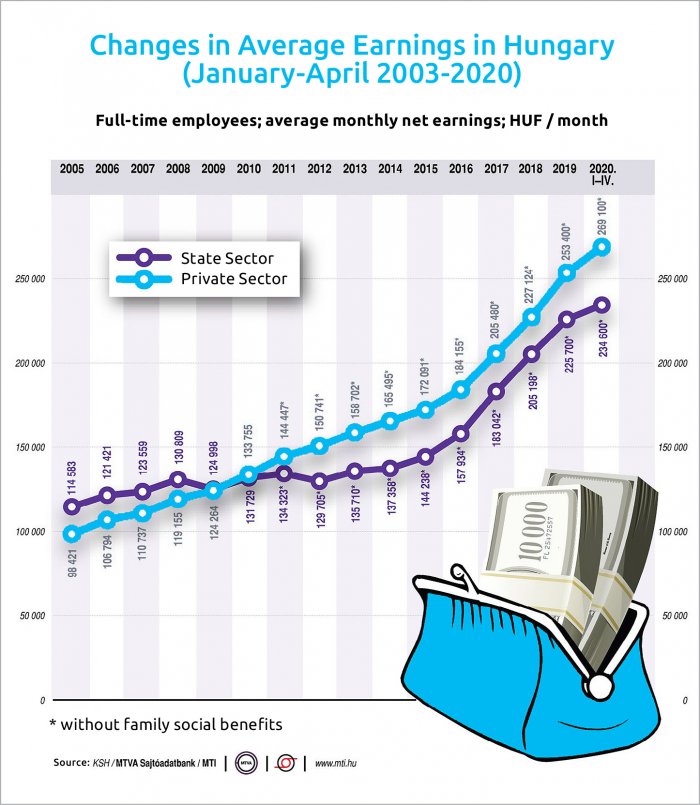Surprise Move by Central Bank Rattles Forint

The Monetary Council of the National Bank of Hungary (MNB) surprised the markets with a decision that took what had already been a record-low base rate down to 0.75%. The move sent the volatile forint to a historic low.
In an unexpected move, the MNB cut the base rate by 15 basis points to 0.75% on June 23. The base rate had been set at 0.9% since May 25, 2016, so the current decision marks the first time in four years that the central bank has utilized this tool; up until now it usually deployed other, so-called non-conventional moves.
But at the latest rate-setting meeting, the Monetary Council decided to further lower what was already a historically low interest rate in order to stimulate the economy.
“In the current extraordinary economic environment, the MNB’s mandate is still to achieve and maintain price stability, to preserve financial stability, as well as to support the government’s economic policy,” the central bank wrote in a press release following the decision.
Based on incoming data, Hungarian economic performance in 2020 is likely to be more subdued than earlier expected, while the outlook for inflation has shifted downwards persistently; therefore, to maintain price stability and support the recovery of economic growth, fine-tuning of the monetary conditions had become necessary, the MNB said in justifying the move.
On the Hop
The decision certainly took the market by surprise, as there had been no direct sign of a rate cut; what’s more, some even thought that the MNB would rather increase the base rate in order to protect the Hungarian currency after its poor performance this year.
However, the possibility of an easing cycle has been in the air for some time, as other central banks in the region had already cut their interest rates in order to counterbalance the devastating effects of the coronavirus-crisis. The MNB, for various reasons, had not gone down that road, until now.
Initially, the central bank started holding auctions, on a weekly basis, to buy government securities early in May, but it has now not held any for more than four weeks in a row. It seemed that the “magic tool”, as it was referred to in the Hungarian press, had started losing its appeal.
Hungarian monetary policy has tried to adjust to the crisis induced by the novel coronavirus, which is a difficult task as there are several uncertain factors to consider. Due to the coronavirus pandemic, disinflationary effects have strengthened generally and outlook for growth in the global economy has deteriorated significantly. In parallel, the leading central banks globally had announced further easing measures.
Strong Fundamentals
The coronavirus pandemic hit the Hungarian economy when its fundamentals were stable, and growth was strong, the MNB notes in its press release following the latest Monetary Council meeting.
The economic policy pursued over the past decade has maintained the country’s macroeconomic balance and reduced its external and internal vulnerability. In the first quarter of 2020, Hungary’s economic growth slowed to 2.2% year-on-year.
However, the Hungarian economy’s growth surplus compared to the euro area far exceeded the value of around three percentage points achieved in recent years. Hungary’s defense against the first wave of the coronavirus has been successful, which provides appropriate foundation for the economic recovery, the press release reads.
The MNB has lowered its economic growth expectations: it now expects the effects of the pandemic to be the strongest in the second quarter, after which a recovery would happen.
“Overall, Hungarian GDP may grow at a restrained pace in 2020. Economic growth is expected to be 0.3–2% in 2020, 3.8–5.1% in 2021, and 3.5–3.7% in 2022,” according to the MNB’s statement. It also says that a pick-up in public investment and an expansion in corporate lending requires a quick ‘V’ shaped economic recovery in the second half of the year.
Forint Struggling
As an immediate effect of the rate cut, the Hungarian forint weakened after the announcement: the forint/euro exchange rate stood at 346 at the beginning of the day on June 23, was at 348 right before the decision, and fell to 350 just after it. It didn’t stop there for long, and has hit further historical lows since: on the morning this paper went to print, the Hungarian currency stood at 355.14 against the euro.
The new deputy governor of the MNB, Barnabás Virág told a press conference that the base rate cut was a “symbolic” step, a “discrete decision”, and not a decision on the start of a cycle. However, he also said that the MNB may cut its base rate by another 15 basis points in July.
However, he emphasized that after the July reduction, should it come, no further cuts should be made to the base rate, as a rate of 0.6% would be appropriate to support economic recovery and strengthen financial stability. Any further reductions after July could thus be ruled out, Virág stressed.
Analysts, however, think that the forint still might easily fall victim to the economic boosting measures deployed by the MNB, as the new prognosis of the bank is more like a target and not an outlook, and further monetary steps are needed in order to meet the target. Such steps are not likely to strengthen the Hungarian currency, but quite the contrary, analysts say. Most agree that a forint exchange rate to the euro of around 330 is a thing of the past and the new course might be at around 350.
Numbers to Watch in the Coming Weeks
On July 6, the Central Statistical Office (KSH) will publish retail trade figures for May; as lockdown was still in place for the most of the month, no miracle is expected here. The same applies to the May industrial production data; in April, the KSH registered a massive, 36.8% year-on-year fall. On July 8, the KSH will release the consumer price index for June.
SUPPORT THE BUDAPEST BUSINESS JOURNAL
Producing journalism that is worthy of the name is a costly business. For 27 years, the publishers, editors and reporters of the Budapest Business Journal have striven to bring you business news that works, information that you can trust, that is factual, accurate and presented without fear or favor.
Newspaper organizations across the globe have struggled to find a business model that allows them to continue to excel, without compromising their ability to perform. Most recently, some have experimented with the idea of involving their most important stakeholders, their readers.
We would like to offer that same opportunity to our readers. We would like to invite you to help us deliver the quality business journalism you require. Hit our Support the BBJ button and you can choose the how much and how often you send us your contributions.







